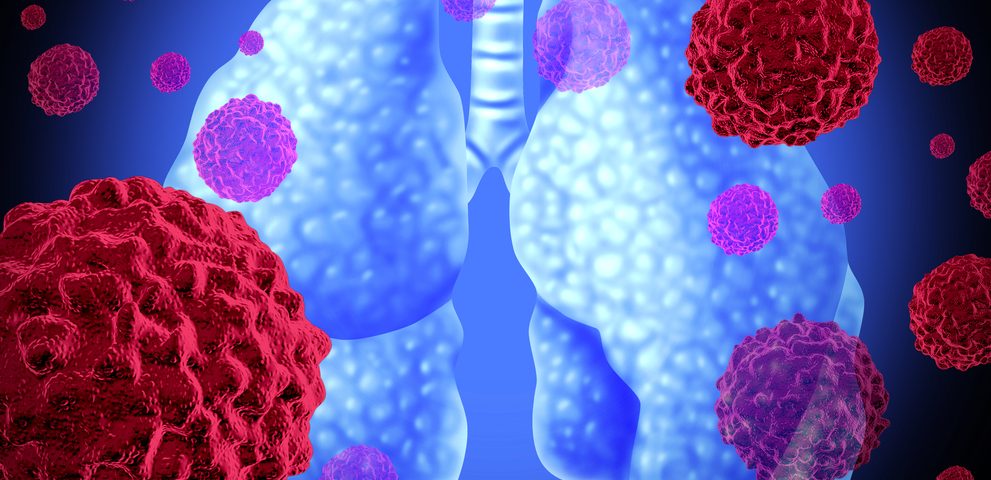Note: This story was updated May 19, 2020, to note that Opdivo binds to PD-1 on immune T-cells, not to PD-L1 on tumor cells.
The U.S. Food and Drug Administration (FDA) has agreed to a priority review of Bristol-Myers Squibb’s application for expanding the label of Opdivo (nivolumab), combined with Yervoy (ipilimumab), as a first treatment choice for people with advanced non-small cell lung cancer (NSCLC) without alterations in the EGFR or ALK genes.
Priority review means a final decision should be made within six months, rather than the 10 months normally taken under standard review. A decision on the supplemental biologics license application is expected in May this year.
Opdivo and Yervoy — both sold by Bristol-Myers Squibb — are two immunotherapies falling under the umbrella of immune checkpoint inhibitors. They are both antibodies, each of which target different proteins involved in the processes used by cancer cells to escape the immune system. Opdivo targets the PD-1 protein on T-cells — immune cells with the ability to fight tumors – and Yervoy targets the CTLA-4 protein on that same immune cell subset.
Opdivo is currently approved alone or added to Yervoy for the treatment of various cancer types. For advanced NSCLC, Opdivo is approved for use alone and only for patients who failed to respond or stopped responding to prior therapy. It is not yet approved as a first-line treatment for advanced NSCLC, which is what the company is now seeking.
Yervoy is approved as a single therapy for advanced melanoma, a type of skin cancer, and in combination with Opdivo for certain kidney and colorectal cancers.
“The FDA’s acceptance of our application for Opdivo plus Yervoy represents an important milestone for patients with lung cancer in the United States, where, despite recent treatment advances, lung cancer remains the cause of more than 150,000 deaths each year,” Sabine Maier, MD, development lead for thoracic cancers at Bristol-Myers Squibb, said in a press release.
“Lung cancer is the third tumor type where the combination of Opdivo and Yervoy has demonstrated significant long-term overall survival benefit in a randomized Phase 3 trial, which further validates the immunologic rationale for dual immuno-oncology therapy,” Maier added.
The Phase 3 trial (NCT02477826), known as CheckMate-227, which is supporting the label expansion request for Opdivo, is evaluating the safety and clinical benefits of initial treatment with Opdivo-based regimens versus chemotherapy in patients with advanced NSCLC (stage 4 or recurrent cancer) who had not previously received any anticancer medical therapy.
The first part of the study included two groups of patients — Part 1a, made up of 1,189 patients with PD-L1-positive tumors who were randomly assigned to receive either Opdivo plus low-dose Yervoy, Opdivo alone, or chemotherapy; and Part 1b, consisting of 550 patients with PD-L1-negative tumors randomly given Opdivo plus low-dose Yervoy, Opdivo plus chemotherapy, or chemotherapy alone.
Opdivo was administered at 3 mg/kg every two weeks, and a low dose of Yervoy (1 mg/kg) was given every six weeks. Both were given directly into the bloodstream (intravenous injections).
As previously reported, one of the study’s primary goals was met, with the Opdivo-Yervoy combo extending the time patients with high tumor mutational burden (tumors with a high number of mutations) lived without disease worsening, compared with chemotherapy and regardless of PD-L1 expression.
At one year of treatment, 42.6% of patients on Opdivo-Yervoy were alive and their disease had not worsened, compared with 13.2% of those treated with chemotherapy. The median time patients lived without cancer progression was 7.2 months versus 5.5 months, respectively.
The other primary goal also was met, with the combo extending the overall survival of patients with PD-L1-positive tumors from 14.9 to 17.1 months. At two years of treatment, 40% of patients in the combination were alive, compared with 32.8% of those on chemotherapy alone.
A benefit also was observed for patients with PD-L1-negative tumors, which had a median survival of 17.2 months under combo therapy versus a survival of 12.2 months on chemotherapy.
Opdivo-Yervoy’s safety profile was consistent with previously reported studies, and no new safety signals were observed.


